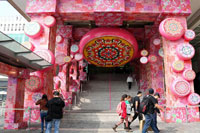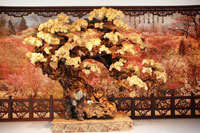Standing debate
Updated: 2013-01-28 10:02
By Raymond Zhou (China Daily)
|
||||||||
The half-price movement has gathered momentum online and has been widely reported by the traditional media. A survey conducted by Beijing News shows 91 percent of respondents favor such a discount while less than 5 percent oppose it. Of those who support the call, 42 percent argue for a 50-percent or more cut while the rest endorse a smaller reduction.
The railway department, in reluctant response, said it is not feasible. What if a passenger with a seat leaves at the next station and the guy standing next to him gets it for the rest of the journey? How do you calculate for such seating and standing permutations?
 |
Others propose that a few standing-room-only cars be reserved so that standing passengers won't mingle in the seating area. But wouldn't that mean a colossal waste of space desperately needed during this holiday season?
From an economic point of view, it is not that standing tickets are too expensive, but, rather, the regular tickets have fallen far behind the rate of inflation. Train tickets rose a couple of times a dozen years ago when train speeds were increased.
What was considered outrageous a decade ago is bargain-basement nowadays. A taxi ride across town can cost 100 yuan, but a 40-hour train ride from Beijing to the Sichuan-Yunnan border on a hard berth is less than 1,000 yuan.
In the current climate of populism, it is a cardinal sin to say a train ticket is too cheap. But if you compare it with other products and services, it is one of the few things that has stagnated, except for the high-speed lines, that is. I have the strong feeling that train tickets are like laws: Once they're set you cannot change them incrementally, so a high price is set in advance to anticipate a decade of declining profit margins.
However, the railway department does not have too much leeway in setting prices. As it is a State monopoly, it has to take on certain responsibilities that fall on the shoulders of government agencies.
The chunyun traffic is not price elastic, meaning people have to make their trips regardless of the price. Raising prices will not ease the jam, but will create more social inequity as the pressure is felt most acutely by the low-income demographics.
|
 |
Likewise, lowering prices for standing tickets is reasonable mostly in the context of social fairness and income redistribution. As public transport in Chinese cities is heavily subsidized, with the benefits going mostly to middle- and-low-income brackets, the same idea seems to apply to long-distance travel.
But we have to weigh both the pros and cons before jumping to conclusions. In China, prices are more often artificially high, such as for performing arts and certain entertainment venues.
Artificially low prices, such as on Beijing's subway, amount to a systematic subsidy. But if overused, they can stymie normal economic activities. If the government essentially gives something away, there is no way an alternative service offered by a business can compete.
It is understandable people want low prices. That's human nature. But don't forget, government subsidies come from taxpayers. So, the right question is, is this the best use for a subsidy? Of course, if you compare it with government waste or corruption, this is much more worthwhile. But what if you have to choose between writing off a chunk of railway travel and funding for educating poverty-stricken children?
China has been developing a market economy for three decades now, and we have moved from an era of scarcity to one of abundance - for most products and services. As we plunge deeper into the free market, a feeling of nostalgia has re-emerged. Looking at the dizzying choices and stratospheric prices, people may be enticed by the old ways of fixed but low prices - never mind that it inevitably leads to undersupply and long lines.
The right approach, as I see it, is to increase capacity while at the same time maintain a reasonable range of options. Building high-speed lines is the ultimate solution to easing the chunyun traffic. But low-priced services should not be totally eliminated. They cater to those with different purchasing power - and those who value time differently. When there are choices, people will divert their energy to researching the options rather than criticizing the lack of price differential for sitting and standing tickets.
Subsidized pricing is not a silver bullet; instead, it could be a wolf in sheep's skin.
Contact the writer at raymondzhou@chinadaily.com.cn.

 'Taken 2' grabs movie box office crown
'Taken 2' grabs movie box office crown
 Rihanna's 'Diamonds' tops UK pop chart
Rihanna's 'Diamonds' tops UK pop chart
 Fans get look at vintage Rolling Stones
Fans get look at vintage Rolling Stones
 Celebrities attend Power of Women event
Celebrities attend Power of Women event
 Ang Lee breaks 'every rule' to make unlikely new Life of Pi film
Ang Lee breaks 'every rule' to make unlikely new Life of Pi film
 Rihanna almost thrown out of nightclub
Rihanna almost thrown out of nightclub
 'Dark Knight' wins weekend box office
'Dark Knight' wins weekend box office
 'Total Recall' stars gather in Beverly Hills
'Total Recall' stars gather in Beverly Hills
Most Viewed
Editor's Picks

|

|

|

|

|

|
Today's Top News
Boston bombing suspect reported cornered on boat
7.0-magnitude quake hits Sichuan
Cross-talk artist helps to spread the word
'Green' awareness levels drop in Beijing
Palace Museum spruces up
First couple on Time's list of most influential
H7N9 flu transmission studied
Trading channels 'need to broaden'
US Weekly

|

|







